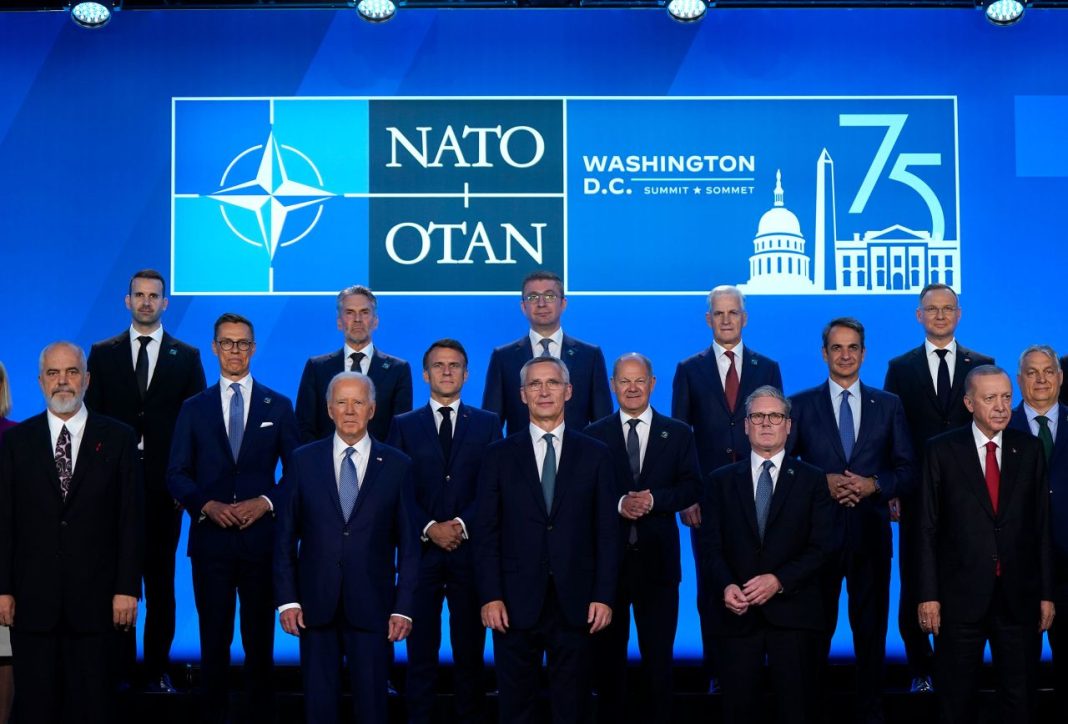The pledges, included in a final communique following a NATO summit in Washington, DC, on Wednesday, came as the alliance’s members also announced individual and joint steps to boost Ukraine’s and Europe’s security.
This includes the United States, Netherlands and Denmark announcing that the first NATO-provided F-16 fighter jets would be in the hands of Ukrainian military pilots by this summer. The US also announced it will be deploying longer-range missiles in Germany in 2026, a major step aimed at countering what the allies say is Russia’s growing threat to Europe.
The move will send Germany the most potent US weapons to be based on the European continent since the Cold War. It would have been banned under the Intermediate-Range Nuclear Forces Treaty signed by the US and the Soviet Union in 1987, but that collapsed in 2019.
Ukrainian President Volodymyr Zelenskyy posted on social media platform X his appreciation of NATO’s effort to strengthen his air force, saying the new fighter jets “bring just and lasting peace closer, demonstrating that terror must fail”.
The alliance’s communique, declaring “Ukraine’s future is in NATO”, promised to continue to support Kyiv “on its irreversible path to full Euro-Atlantic integration, including NATO membership”. But the invitation would come “when Allies agree and conditions are met”, it added.
NATO Secretary-General Jens Stoltenberg stressed that Ukraine will not join the alliance’s ranks immediately, but insisted that must happen after the war is over to ensure that Russia never attacks Kyiv again.
Of the overall NATO assistance, he said, “We are not doing this because we want to prolong a war. We are doing it because we want to end a war as soon as possible.”
The US and some other countries have opposed membership for Ukraine during the conflict with Russia to avoid an escalation of tensions that could lead to a larger war. They also have stressed that Ukraine must take significant steps to address corruption as well as other systemic reforms.
The NATO communique also strengthened past language on China, calling it a “decisive enabler” of Russia’s war effort in Ukraine and stressing Beijing continues to pose systemic challenges to Euro-Atlantic security.
NATO members also hit out at relations between Beijing and Moscow in the declaration issued at the bloc’s 75th anniversary summit in Washington DC on Wednesday, claiming that China continues to “challenge our interests, security and values”.
“The deepening strategic partnership between Russia and the PRC and their mutually reinforcing attempts to undercut and reshape the rules-based international order, are a cause for profound concern,” added the document, which was signed by the heads of state and government of NATO members.
The US-led military bloc further accused China of shoring up the Russian defense industry by transferring dual-use materials and components, as well as engaging in “malicious cyber and hybrid activities”.
Responding to the allegations on Thursday, a spokesperson for the Chinese Mission to the EU described them as “provocative with obvious lies and smears”. Beijing has “lodged serious representations with” the bloc, the spokesperson added.
The mission reiterated that China “is not the creator to the Ukraine crisis” and insisted that Beijing is seeking to “promote peace talks and seek [a] political settlement”.
“[China] never provide[s] lethal weapons to either party of the conflict, and exercise[s] strict export control on dual-use goods,” the spokesperson said, adding NATO has been “fanning the flames” of the Ukraine conflict while scapegoating others.
Beijing also warned NATO from expanding into the Asia-Pacific and disrupting peace in the region, accusing a “certain power” of attempting to “maintain hegemony”.
“NATO should stop hyping up the so-called China threat and provoking confrontation and rivalry,” the mission’s statement concluded.
